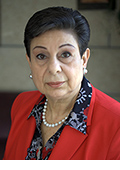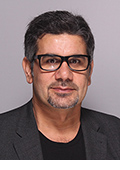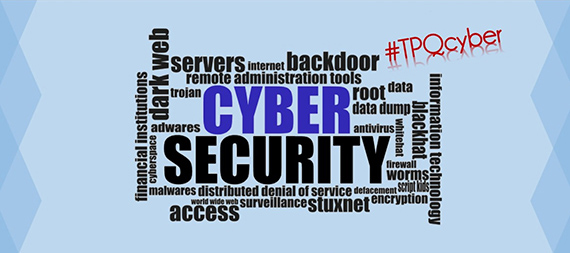| If you can't view the email, please click here. |
|
|
|
From the Desk of the Editor
Süreya Martha Köprülü

“This issue of TPQ takes up a myriad of issues that the Middle East is grappling with today: from protracted conflicts and the increasing complexity of proxy wars, to changing regional blocs and emerging powers. The Arab uprisings of 2011 remain an important fulcrum for the changing political landscape of the Middle East, and as many of our authors contend, the underlying problems and basic drivers of the revolutions still exist today.”
“Situating Turkey amid the turbulent kaleidoscope of change in the Middle East is increasingly complex. Ankara’s jumbled regional foreign policy – particularly since 2011 – has been wrought with miscalculations and contradictions. Once on the fringe of the region, Turkey now has a stake in many of MENA’s conflicts, and is incurring spillover costs: an escalating conflict with the Kurdistan Worker’s Party (PKK), the burden of hosting around three million refugees, and the threat of returning jihadists from Syria.”
|
|
Palestinian Realities and the Peace Imperative
Interview with Hanan Ashrawi

“One thing that really worries me is the possible end of the two-state solution and the lack of any other alternatives. This is primarily because of Israeli policies – extremism, violence, ideology, impunity – but also because of the lack of all factors needed to achieve a just solution, whether American, European, regional, or Israeli. I do not call it a conflict because it is a situation of occupier and occupied – a situation of control, of enslavement, of one state thinking it has the full right to do what it wants to another people with full impunity.”
“After we were accorded ‘non-member observer state’ status by the UN in 2012, we moved to join international treaties and conventions as part of our own institution-building goals and as a means of protection. However, we witnessed a hysterical reaction – particularly by the US – to us joining UNESCO, Interpol, or when we acceded to other conventions.”
“These last 10 years have been very painful because the rift between Fatah and Hamas debilitated the whole Palestinian body politic. The situation really weakened us, as well as the Palestinian cause. And it was used against the Palestinians by the international community.”
|
|
|
The Trump Administration and Global Security
James F. Jeffrey

“President Donald Trump’s unique approach to foreign policy is, first, reflected in the tone and spontaneity of his off-the-cuff comments about diplomatic and security issues. Given their life and death gravitas, other presidents exercise caution and restraint in their public messaging. Not Trump.”
“On North Korea, Trump’s rhetoric in response to truly dangerous developments appears to replace Obama’s benign neglect with imminent preventative war. But in terms of actual diplomatic or military steps, either to give substance to American threats or signal possible compromises, nothing has been done, despite a rich menu of options and despite the enormity of the new threat out of Pyongyang.”
“To a degree never seen before in any American government, Trump’s senior foreign policy team routinely contradict and correct him, and second, almost always prevail with more thoughtful policy approaches at the end of the day. This is an awful way to conduct diplomacy, with a real chance of miscommunication in life-or-death circumstances, but better than the likely alternative – Trump’s rants actually being translated into policy.”
|
|
|
The Arab Spring Seven Years On: Failure or Just the Beginning?
Koert Debeuf

“Comparing the rule of Morsi with the rule of Robespierre seems to be unfair for Morsi and his Muslim Brotherhood. On the other hand, the fanaticism, the terror, and the choice between virtue or death does ring a bell when we compare it with the Islamic State of Iraq and Syria (ISIS).”
“Like the French Revolution, the causes of the Arab Revolution are to be found in demographics, social and economic injustice, and in the repression of free speech and political rights. The current situation in the Arab world does not look particularly hopeful, but if we were living in France in the late 1790s we would have been very pessimistic too.”
|
|
|
Turkey’s Forays into the Middle East
Dimitar Bechev & Joost Hiltermann

“As an important component of what some referred to as ‘emerging neo-Ottomanism,’ Ankara believed it could parlay its new popularity, economic strength, and growing regional networks into diplomatic muscle deployed in furtherance of conflict resolution. It presented itself as a mediator between Israel and Syria in 2007; between Israel and Hamas; and between Iran and the UN Security Council over Tehran’s nuclear program.”
“The Arab awakenings and their violent aftermath served to unravel the edifice that AKP leaders had built. Most of the gambles the AKP took, starting from the mid-2000s but especially from 2011 onwards, boomeranged. Turkey’s challenge today is to restore equipoise in its regional relations and in particular to prevent any further negative spillover from the conflicts and vacuum in Syria and Iraq, while finding ways to address its own worsening internal convulsions.”
|
|
|
EU-GCC Relations and the Risk of Irrelevance
Silvia Colombo

“Among the obstacles that have stood in the way towards greater EU-GCC cooperation, two new dynamics have to be mentioned. First, internal tensions among the GCC countries and second, the re-emergence of Iran as a hegemonic contender at the regional level.”
“On the one hand, the GCC is going through one of the gravest crises since its creation in 1981 and might cease to defacto exist as a result of that. On the other, multilateral EU-GCC relations continue to be subject to the complexities of a region-to-region framework and could easily be overtaken by EU-Iran relations in terms of strategic importance in the years to come.”
|
|
|
The GGC Crisis: Regional Realignment or Paralysis?
Kristian Coates Ulrichsen

“A key preoccupation of Qatar’s post-1995 leadership was to pursue a set of autonomous regional policies designed to take the country out of the Saudi shadow and create durable international linkages (through the supply of LNG) that increased the range of stakeholders with a direct stake in Qatari stability. Qatar’s support for regional Islamists, notably – but not only – the Muslim Brotherhood, and the provision of Doha-based Al Jazeera as a platform for groups criticizing regional states caused periods of intense friction.”
“The longer the crisis continues, the more Qataris may begin to question the utility of belonging to an organization that appears powerless to prevent or control the bilateral application of pressure among its members. US adversaries such as Russia and Iran may try to widen the cracks that have appeared within the GCC and make inroads into the hitherto-impenetrable network of security partnerships that have bound the Gulf States under the Western security umbrella for decades.”
|
|
|
The Gulf Crisis and a Pariah’s Fling with Islamism
Ola Salem

“As soon as Qatar had a new emir, the tiny Gulf state wasted no time in making itself relevant by signing energy agreements with a number of emerging markets. The emir, within months of his coup, helped set up the Qatari-owned Al Jazeera news channel in 1996 by providing a loan of 137 million dollars in start-up funds. Al Jazeera has since become a major actor in all of Qatar’s disputes with its neighbors, consistently giving dissidents and jihadis a media platform.”
“For the UAE and Saudi Arabia, and Bahrain in particular, a long and bitter history with Islamists has led to these three countries having zero tolerance for them. This was a lesson hard learned after the Muslim Brotherhood had spent three decades meddling in the internal affairs of the three countries just after its members fled from Egypt in the 1970s and 1980s.”
|
|
|
Islamist Actors After the 2011 Arab Uprisings
Nur Köprülü

“Today, the role of the Ennahda Party primarily during the parliamentary and presidential elections, as well as with drafting the new charter, strengthens the argument that Tunisia’s is the only case in the Middle East with a bottom-up constitution-making in the region, rather than a top-down.”
“The Islamist parties in Tunisia, Jordan, and Morocco are able to act within the political system, and what the Arab uprisings have brought them is a call for more political reform. The cases of Tunisia and Jordan highlight the historical and structural variations in their trajectories of state formation, and the relations between the ruling elites and the Islamist movement of each country exemplify this disparity.”
|
|
|
Iran’s Post-ISIS Regional Strategy
Ali Hashem

“The decision to intervene in Iraq was taken quickly by Tehran and thanks to the fatwa issued by Iraq’ highest religious authority, Ayatollah Ali Sistani, who called on Iraqis to take arms and wage holy Jihad against ISIS, the threat was transformed into an opportunity. The unprecedented fatwa paved the way for the formation of the Popular Mobilization Units (PMU), known as Al Hashd Al Shaabi. This saw tens of thousands of Iraqi volunteers mobilizing under the direct command of two of Iran’s loyal allies in Iraq.”
“The Iraqi Kurdistan independence referendum on 25 September 2017 gave Tehran the opportunity to emerge as a decisive decision maker in Iraq, despite the fact that Iranian pressure on the Kurdistan Regional Government (KRG) to postpone their plans was fruitless. The common menace of an independent Kurdistan brought Iran and Turkey on the same track, providing both countries with a chance to coordinate and decide on how to confront the new status.”
|
|
|
Syria at a Crossroads: “A Peace to End All Peace”?
Ibrahim Hamidi

“There is a worrying parallel between what the US and Russia are doing in Syria today, and the French and British models of the 20th century. This is especially the case if temporary solutions that do not address the Syrian people’s substantive concerns are proposed. A short-sighted agreement would invariably cause new types of struggles and rebellion to emerge, thus leaving the Syrian crisis insoluble.”
“The deal signed on 11 November 2017 by Trump and Putin covered the cooperation between the two countries’ armies to fight terrorism, defeat ISIS, maintain the no-clash agreement between the two parties, and withdraw the Iranian militias from the South. However, this is not sufficient for Syria and the Syrian people. There is a real need to focus on Provision 3 of the US-Russian agreement concerning the implementation of UNCS Resolution 2254, which calls for a ceasefire and political settlement.”
|
|
|
What Would a US Withdrawal from the Iran Deal Mean for the Regional Order?
Saeid Jafari

“Throughout his presidency, Hassan Rouhani has enjoyed the political benefits of the Joint Comprehensive Plan of Action (JCPOA), including pushing back hard-liners. Now, what will happen to him and his moderate supporters if he loses this advantage? The simple answer is that the president’s hard-line opponents, including the Islamic Revolutionary Guard Corps (IRGC), will raise their voices and accuse him, the reformists, and the moderates in Iran of being incompetent and naive towards the US and the West.”
“The failure of the US administration to meet the commitments incorporated in the Iran nuclear deal has not only wasted over a decade of effort in resolving one of the world’s most complicated global security cases, but other countries have lost their trust in the negotiation mechanism and diplomacy in part due to this failure.”
|
|
|
Cyber Defense at NATO: From Wales to Warsaw, and Beyond
Neil Robinson

“The 2007 cyber attacks against Estonia, which for a brief period of time took most of the country offline, are universally regarded as a ‘wakeup call.’ For many, the attacks offer an important case study of how nation-states utilize cyberspace as a medium to pursue their strategic aims, making it all the more timely to reflect upon what the North Atlantic Alliance, founded nearly 70 years ago, is doing about cyber attacks.”
“The Enhanced NATO Policy on Cyber Defence endorsed at the Wales Summit in 2014 was instrumental in a number of ways, not least for the manner in which it brought cyber defense under the umbrella of collective defense, established a framework of assistance to Allies, reinforced capacity and capability development including through training and exercises, and enhanced partnerships, particularly by establishing the NATO Industry Cyber Partnership (NICP).”
|
|
|
The Right to Respond? States and the Cyber Arena
François Delerue

“Nations have adopted strategies to cope with cyber operations in two distinct phases. In the first phase, they dealt with the pressing situation of growing cyber threats and tried to integrate solutions that went beyond simple cyber responses. The urgency of the situation led states to focus on devising more robust military and self-defense strategies. In the second phase that is currently underway, states will need to integrate the wide range of possible classifications of state-sponsored cyber operations into their national strategies.”
“Denial-of-service (DoS) attacks do not involve the planting of malware into the targeted computers. There is, therefore, no penetration into a foreign system, but they still negatively affect it. For a majority of scholars, the occurrence of the effects within a foreign system suffices to constitute a violation of territorial sovereignty. Consequently, a state-sponsored DoS attack in a foreign state might be considered a violation of territorial sovereignty.”
|
|
|
Navigating the Cyber Storm
TPQ Event Analysis

“The 2007 cyber attack against Estonia put cybersecurity on the map as a global concern, but only recently has it become a mainstream issue. This trend is due to several high-profile cyber attacks including Stuxnet in 2010 (a computer worm that disrupted Iranian nuclear facilities), the Sony Pictures Entertainment Hack in 2014, and perhaps most notably, the DNC Hack in 2016, during which the WikiLeaks website published 19,252 emails and 8,034 attachments stolen from the Democratic National Committee (DNC).”
“While information-sharing is a key component of a robust cybersecurity partnership between the public and private sector, striking a right balance between the two is crucial in order to preserve the privacy of our societies. As cyber attacks across the world have grown in intensity and frequency, states have the propensity to place a premium on security.”
|
|
|
Interested in contributing an op-ed to TPQ's blog?
For guidelines click here. |
|
|
The Premium Corporate Sponsor of this Issue
 |
|
|
Thanks to Our Media Partner |
 |
|
|
 |
Phone: +90 212 621 4442 - +90 212 621 9258 Fax: +90 212 531 8718 info@turkishpolicy.com
Click to unsubscribe |
|
|
